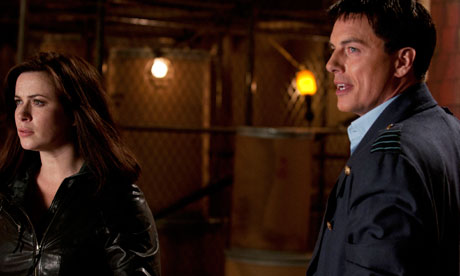
The two regular seasons of Torchwood were pretty weak. The shortened Torchwood: Children of Earth miniseries was pretty good. The question was which direction Miracle Day would lean, as it has the former's longer length but the latter's singular focus on one idea. Unfortunately, it tended toward the weak side of the scale. Miracle Day either didn't take the right lessons from Children of Earth or just didn't apply them correctly, because while I thought it started off pretty strong, it couldn't sustain itself, and I had completely lost interest by the time it ended. It really should have been another five episode run. There just isn't enough story here to justify it being ten hours, and it's all the worse for being stretched out.
The concept is intriguing enough. One day, death basically turns off, and while people can still be crushed and maimed and weakened by disease, their bodies just won't die. Torchwood, or the two surviving members of it, get involved when they receive a message at the exact moment of the "miracle", a message that the CIA detects, causing two agents named Rex and Esther to pursue them. The four team up to figure out what caused the miracle and why, and there's also a completely terrible, nonsensical subplot that ultimately goes nowhere featuring a creepy pedophile murderer played by Bill Pullman whose execution is aborted by the miracle and somehow becomes a popular public speaker for a while.
The show works early because it looks at what would happen if death stopped happening. Hospitals fill up, disease begins to spread like wildfire, doomsday cults form, and quickly the global economy collapses. Procedures and policies that function because death exists break down and have to be rethought. It's interesting stuff, but it gets pushed aside once Torchwood gets a whiff of what's behind it. They quickly learn that a certain pharmaceutical company had stocked up medication for just such an emergency, and must be involved in whatever plot caused the change. They eventually figure out the real truth, which is pretty silly, doesn't capitalize on the concept of death disappearing, and revolves around Jack's two key characteristics - his immortality (which disappears after the miracle) and his willingness to have sex with anyone (which doesn't).
The final answers to the show's question are not satisfying, and the journey to get there is too padded and dull to make that an irrelevant complaint. The new characters don't contribute much either. Pullman's Oswald, as I said, makes no sense. Rex is too much of an asshole on the asshole-rogue scale, and Esther is cute but not much else. The show really doesn't do much with its transition to America, honestly. There's one pretty good for TV action scene in the premiere, and they make a few easy jokes about how the US and the UK are different, but that about covers it. The CIA is also amazingly inept and inconsequential to the plot, with its only success being the introduction of John de Lancie as one of Rex' higher-ups a little too late.
The plot is meandering, with most episodes struggling to stretch themselves to over fifty minutes and too much time wasted before any real information actually gets exposed. It's just a textbook example of how to sully a neat science fiction concept in a television show. I'm not sure if Starz plans to renew their collaboration with the BBC on this, and I'm not sure I care either way. And I definitely hope they don't follow through on their threat in the finale of returning to the same idea.
AAAAAGGGHHHH
16 years ago


































No comments:
Post a Comment